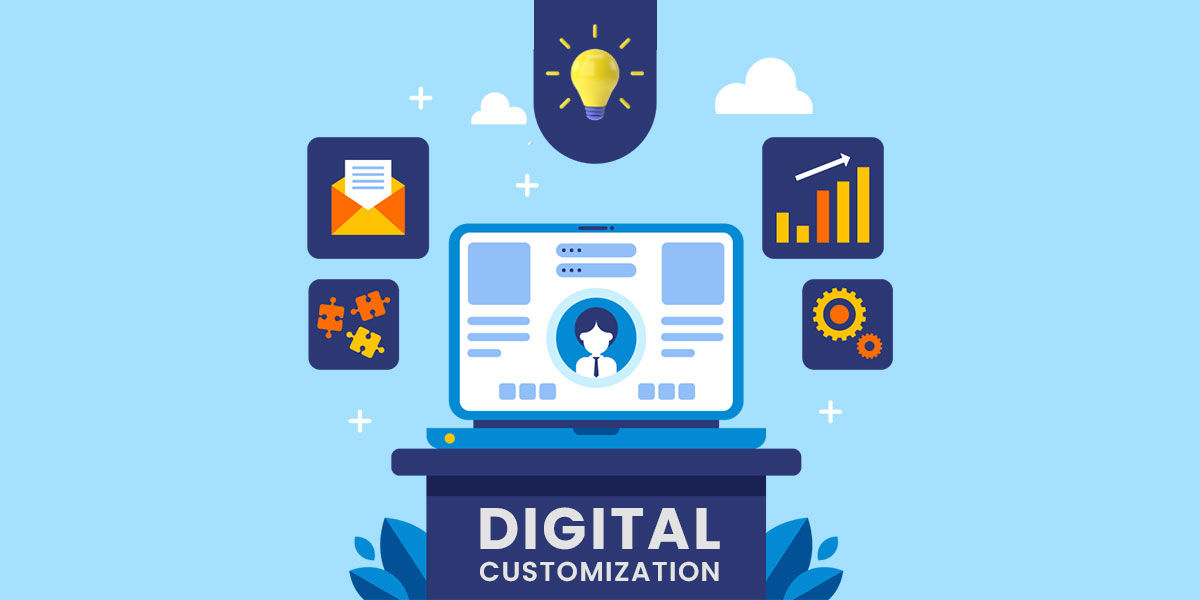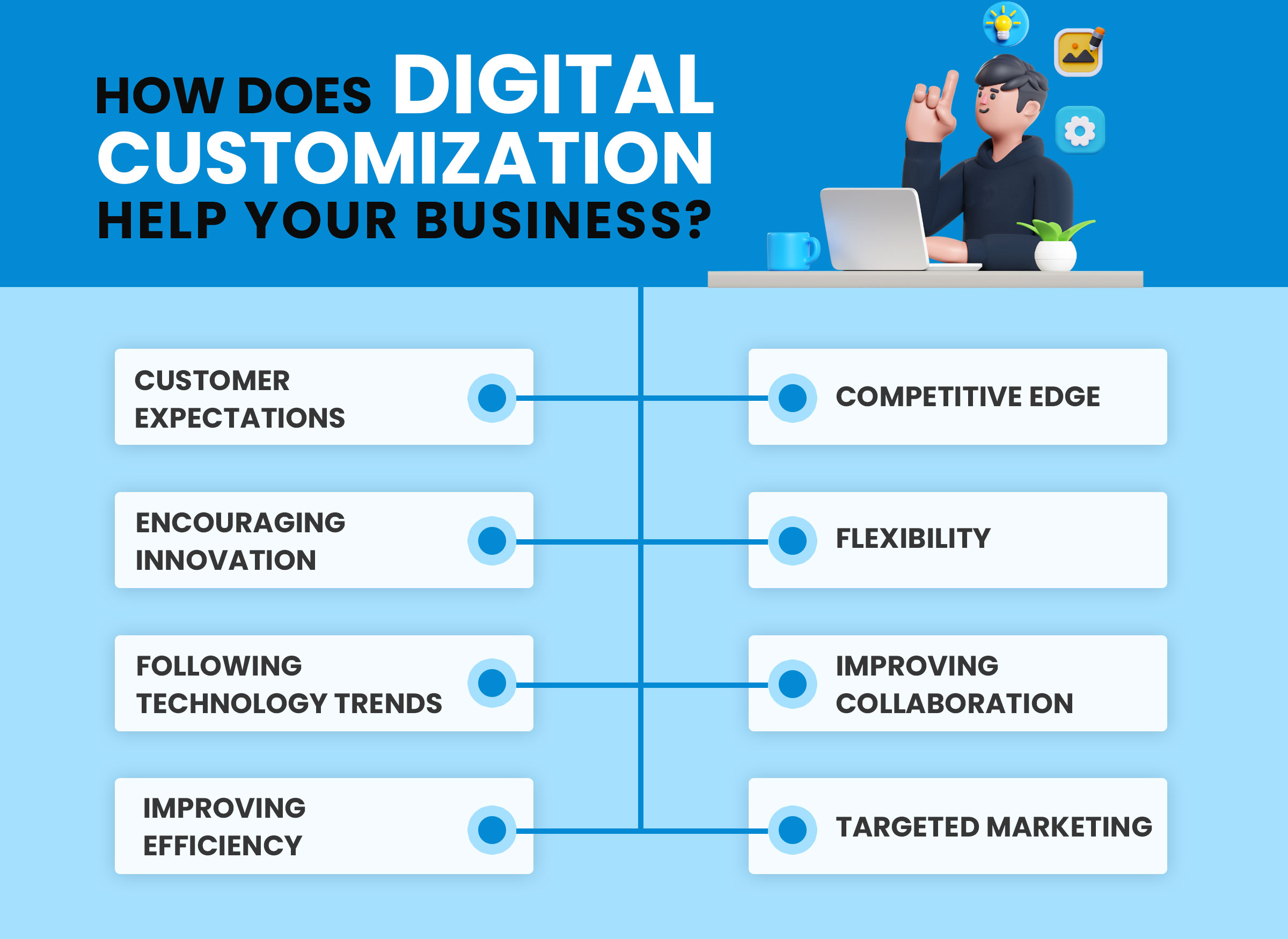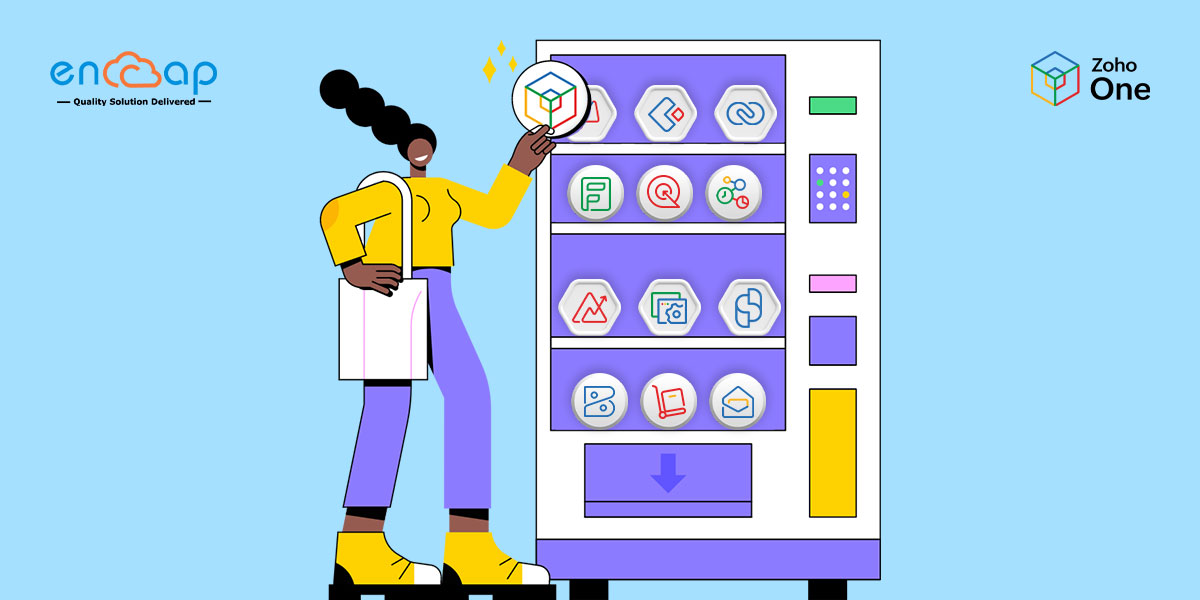What is Digital Customization? How Can It Help Businesses?
The business owners of today often find it challenging to keep pace with the evolving digital landscape. If you are curious about how your business can stay dynamic and relevant in the present age then you must remember that digital transformation is the key. The fact is that businesses that embrace it quickly will survive as the most successful ones.

That said, there is a catch and that is the fact that digital transformation is not enough. To make sure that you thrive, it is important to build a business that is digitally customizable and ever-catering to the needs of the customers. However, how do digital transformation and customization translate into business success?
What must be thought about is the fact that digital transformation is merely a fancy term for moving to the cloud or is it meant to take a specific towards an empowered business strategy. In case you are still wondering how to understand more about digital customization then you must not fear.
In this blog, we will try to know more about why digital customization helps a business thrive and be prepared for the future. Let’s delve further into details and know more about digital customization.
Table of Contents
What is Digital Customization?
The meaning of this term is to understand the process of using digital tools and technologies for customizing services, user experiences, and products so that they meet the specific requirements of individual customers. This is a process that can involve collecting data about consumer behaviour, preferences, and demographics through different channels including mobile apps, social media, and websites.
The data analysis can be done through algorithms and artificial intelligence to generate insights that are capable of delivering personalized markets, customized services, and product recommendations. This digital customization can be achieved by customizing cloud-based software solutions for meeting the needs and workflows of a business.
Cloud software solutions are specifically designed to be configurable to become comfortable while allowing businesses to customize everything from user interfaces to data fields. The customization can be achieved using a wide range of tools and interfaces offered by cloud software vendors including APIs, graphical user interfaces, and scripting languages.
Tools Required for Digital Customization
1. Customizable CRM
To ensure that businesses customize digitally, a CRM application is needed that can be molded for meeting your needs. You must be able to add custom fields for recording additional customer data, create customized workflows for automating tasks, and set up personalized automation rules to trigger actions based on customer behaviour.
For instance, the CRM must allow you to create a custom field that captures the customer’s preferred communication channel and use that information for personalizing communication. Some options that are available are Salesforce, Zoho CRM, HubSpot CRM.
2. Third-Party Application Integration
Integration with third-party applications is necessary for the digital customization of a business because that allows you to connect software tools and services that are commonly used for a business.
In case you use a CRM tool for managing sales and customer relationships, you might even want to integrate it with an email marketing tool for automating email campaigns. When you do this, you can segment customers based on their behaviour and send targeted messages on the basis of their interests and preferences.
Just like this, in case you use accounting software for managing finances, you might want to integrate it with CRM tools for tracking invoices, payments, and other financial data in one place.
After doing so, you will get an improved understanding of cash flow, revenue, and expenses and make informed decisions about a business. The popular integration platforms are Zoho Flow, Microsoft Power Automate, Zapier, etc.
3. Data Management
The software used for businesses must allow you to collect, store, and manage business data in a central location. When you have a unified data management system, you can get an effective view of business operations, performance tracking, and data-driven decisions.
For instance, when you operate an online store, you can effectively use a unified data management tool for tracking sales, customer data, and other business metrics. When you do this, you can get insights into your sales performance, identify trends, and optimize inventory management.
The tools can help in automating business processes by eliminating any need for manual data entry and decreasing errors. For example, when you use a CRM tool, you can integrate it with accounting software for syncing customer data automatically, generating invoices, and collecting payments. Some popular data management tools are Zoho One, Salesforce, and Tableau.
4. Workflow Automation
Workflow automation can be customized for fitting business needs and allow you to create workflows that can reflect business processes. Examples of workflows that can be automated also include lead nurturing where a new lead can be added to the CRM and automatically sent followed by emails that can provide information about a product or service.
In addition, workflow automation also helps in order processing, customer service, and employee onboarding. There are multiple workflow automation tools that are available to be customized for fitting to your business needs. Some options include Zapier, Zoho Workdrive, Zoho Creator, IFTTT, etc.
5. Website Builder
Using a customizable website builder helps in creating a professional-looking website that can reflect a brand and meet specific business needs. It can include customizable templates, a drag-and-drop interface, SEO friendliness, and a mobile responsive design.
Some of the popular customizable website builders that are used widely in the market include Zoho Sites, Wix, and WordPress.
6. Custom App Development
Custom app development is a feature that allows you to create software applications that are attuned to specific needs. Some of the advantages of custom app development can be customized to business needs so that a custom app is designed for a business and ensures that it meets specific requirements.
Custom app development also helps in improving user experience as it is designed with the target audience in mind while proving a user-friendly interface that makes it simple for customers to access information that is needed and perform the tasks that are important.
Custom app development also provides scalability as it is designed to grow your business while allowing you to add new features as your needs keep growing. A couple of custom app development platforms used commonly are Zoho Creator, Microsoft Power Apps, Salesforce Lighting, etc.
7. Customer Service
This also offers high-quality customer support to customers irrespective of their location. A business can offer support via phone, live chat, social media, email, and other digital channels, etc.
Remote customer service helps in improving customer satisfaction by responding quickly to customer inquiries and providing timely and effective support. This also helps in improving customer satisfaction and loyalty.
Other than this, remote customer service helps in accessing a wider customer base, it is cost-effective and also provides much better flexibility. Some of the popular customer service platforms for businesses include Zoho Desk, Freshdesk, and Zendesk.
How Does Digital Customization Help Your Business?
1. Delight Your Customers with Personalized Experiences
Meeting customer expectations is an important aspect of any successful business and the truth is that digital customization can help in achieving this. When you gather data about a customer’s preferences and behaviors, it becomes simple to customize products and services to their needs.
Online retail platforms use customer data to recommend merchandise that people might be interested in on the basis of their browsing and purchasing history. Streaming services such as Netflix also use data for recommending shows and movies that can appeal to users and by offering personalized experiences, businesses can increase customer satisfaction.
2. Innovate and Grow Your Business with New Products and Services
Digital customization also helps in powering innovation by allowing businesses to create new products and services that can cater to customer needs. For instance, the shoe brand Adidas launched a customizable service that allows customers to design their shows on the Internet.
Using digital customization tools, customers can now choose the colours, materials, and design features of their shows which further results in a personalized product that can meet the requirements of the customers completely.
3. Stay Ahead of the Competition with Personalized Offers and Recommendations
As technology continues evolving, businesses that fail to adopt new digital customization methods can be prone to the risk of falling behind their competitors. Businesses can use AI and machine learning technologies to analyze customer data and find patterns and trends that may not offer instant results.
When businesses stay ahead of this trend, they can create new opportunities for their growth and maintain their competitive advantage as well.
4. Improve Efficiency with Automated Tasks and Streamlined Workflows
Digital Customization also helps businesses in improving efficiency as it automates repetitive tasks and streamlines workflows as well. For instance, companies can use software tools for automating data entry and for customer support tasks as well as which helps in freeing up employee time for focusing more on strategic initiatives.
In addition, businesses can customize software solutions for meeting specific needs that can further ensure workflows are customized to meet specific requirements and are as effective as possible.

5. Distinct Customized Offers & Personalized Recommendations
The process of digital customization helps businesses to differentiate themselves from competitors by providing specific products and services that are customized to their needs. Some of the food delivery services also offer customers the ability to customize orders by adding and removing ingredients.
In addition, beauty retailers also offer personalized recommendations based on customer skin types and beauty preferences. A range of these personalized experiences helps businesses to set themselves apart from their competition and even attract new customers.
6. Adapt to Changing Market Conditions with Flexible Solutions
The possession of digital customization can also be helpful for businesses to maintain flexibility as they keep growing and evolving.
For instance, businesses can use cloud-based software solutions that can get customized and scaled to meet specific business needs. The flexibility allows businesses to become comfortable with changing market conditions as required.
7. Improve Collaboration with Effective Communication and Sharing
Digital customization also helps in improving collaboration by offering employees tools and resources that should be used for working together effectively. Businesses can use project management software for streamlining communication and ensuring all team members are on the same page.
In addition, businesses can also customize communication platforms for meeting specific needs and ensuring that the team members are sharing information easily and effectively. This results in effective project work and meeting deadlines quickly.
8. Target Your Marketing with Personalized Messages
Digital customization helps businesses to create targeted marketing campaigns that can be tailored to individual customer needs and preferences. For instance, businesses can use customer data for creating personalized email campaigns and social media ads that speak directly to interests and behaviors.
By offering personalized experiences, businesses can increase the efficacy of their marketing campaigns and achieve a better return on investments.
Zoho One For Digital Customization
After exploring the different tools required for the digital customization of a business, it is clear that having a unified solution is the way to go. Using various stand-alone software applications can somewhat prove to be inefficient which is why Zoho One is the best solution.

Zoho One is an all-in-one and unified cloud-based software suite that is capable of offering over 45+ applications including key tools for digital customization. With the adoption of Zoho One, you can customize your business, manage unified data, automate workflows, build a customizable website, develop custom apps, and provide remote customer service as well.
Digital Customization: A Win-Win for Businesses and Customers
Digital customization has the ability to directly benefit business owners by allowing them to collect and analyse data and customize project management tools, set fixed goals, streamline operations, and improve customer experience.
By using digital customization, business owners can gain insights into their business performance and stay focused on what is important which is growth. Starting from personalized recommendations to targeted marketing campaigns, digital customization can help businesses achieve objectives and become successful in the present business environment.

In case you own a business and wish to streamline your work so that it gives you better results then you must understand that digital customization is of immense importance. Zoho provides a suite of applications that are practical, efficient, and cost-effective for digitally customizing a business.
Get in touch with the expert Zoho consultants at Encaptechno to know more about how Zoho applications can transform your business for the better after the implementation of Zoho applications.
No comments